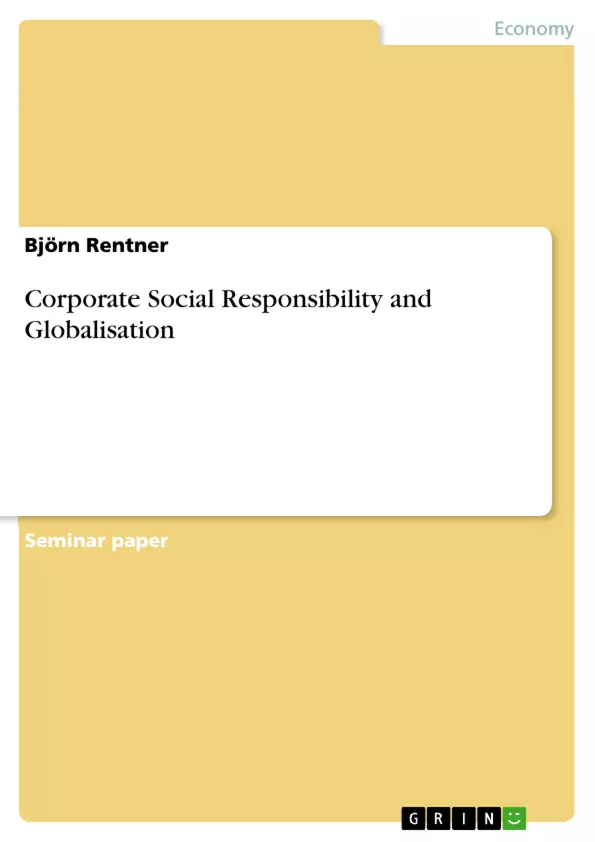Is corporate social responsibility a new business trend or perhaps a breeding ground competitive advantage? It definitely is the buzzword of the early 21st century business. The impact of business on the social and natural environment has been more or less under discussion for the past 40 years but just lately it has become the most topical issue in business environment. Investors, academics, NGOs and business consultants are all talking about corporate social responsibility. The concept Corporate Social Responsibility (CSR) can be used as an umbrella term for a range of terms such as corporate responsibility, corporate citizenship, accountability, transparency, triple bottom line management, sustainability, reputation management and people, planet & profit (Kokko 2002, 69). According to Berthoin, Dierkes, MacMillan & Marz (2003, 27) the CSR issue has recently had three significant developments. Firstly, international organisations have launched CSR initiatives such as GRI and EU Green Paper to promote socially responsible behaviour and social reporting. Secondly, the concept “triple bottom line” (TBL) was introduced to focus the corporations not just on the economic value they add, but also on the environmental and social value they add and destroy. Thirdly, the investors have realised that the value of their investment portfolio may fall if companies act in a socially irresponsible manner. Thus we can infer that there is a growing need for companies to incorporate CSR into their business strategy and everyday business behaviour.
The purpose of this paper is to obtain knowledge of CSR in global business environment. [...]
Inhaltsverzeichnis (Table of Contents)
- Introduction
- Ideologies behind CORPORATE SOCIAL RESPONSIBILITY
- Shareholders vs. Stakeholders
- Corporate Social Performance
- Responsibilities In Society
- Social Responsiveness
- Social Issues Management
- Social responsibility in strategy
- Drivers of implementation
- Moving From Local to Global
- Obligations of Behavior
- Civil Foundation
- Consumers and Company image
- Non Governmental Organisations
- The Triple Bottom Line
- The basis of CSR reporting
- Global Reporting Initiative
- SA 8000 and AA 1000
- CSR Auditing
- Summary
Zielsetzung und Themenschwerpunkte (Objectives and Key Themes)
This paper aims to provide an in-depth understanding of Corporate Social Responsibility (CSR) within the global business environment. It analyzes the underlying ideologies of CSR, examines its integration into business strategy, and explores how CSR can be applied to everyday business practices. The primary objective is to understand the potential benefits of incorporating CSR into business operations.
- Ideologies of CSR: Examining the shareholder, stakeholder, and broad perspectives on corporate social responsibility.
- Integration of CSR into Business Strategy: Analyzing how CSR aligns with strategic goals and objectives.
- Application of CSR in Everyday Business: Exploring practical applications of CSR across various business functions.
- Stakeholder Engagement: Investigating the role of various stakeholders in driving and shaping CSR initiatives.
- CSR Reporting and Measurement: Examining the different frameworks and methodologies used for reporting and evaluating CSR performance.
Zusammenfassung der Kapitel (Chapter Summaries)
- Introduction: The paper introduces Corporate Social Responsibility (CSR) as a crucial aspect of contemporary business practices. It discusses the growing importance of CSR in addressing the impact of business on social and natural environments. The paper highlights the increased focus on CSR by investors, academics, NGOs, and business consultants.
- Ideologies behind CORPORATE SOCIAL RESPONSIBILITY: This chapter delves into the theoretical foundations of CSR, exploring three prominent ideologies: shareholder, stakeholder, and broad perspectives. It examines the arguments and justifications for each perspective, highlighting the contrasting viewpoints on the role and responsibilities of companies towards their stakeholders and society at large.
- Social Responsibility in Strategy: This chapter explores the practical implications of CSR by examining its integration into business strategy. It discusses the various drivers of CSR implementation, including stakeholder pressure, legal obligations, and competitive advantage. The chapter also addresses the evolving nature of CSR from a local to a global perspective, emphasizing the increasing importance of international standards and practices.
- The Basis of CSR Reporting: This chapter focuses on the reporting frameworks and mechanisms used to evaluate and communicate CSR performance. It examines the Global Reporting Initiative (GRI), SA 8000, and AA 1000 standards, highlighting their role in promoting transparency and accountability in CSR practices.
Schlüsselwörter (Keywords)
The paper focuses on key concepts and themes related to Corporate Social Responsibility (CSR) within the global business context. These include stakeholder engagement, triple bottom line, sustainability, corporate citizenship, social responsibility, and ethical business practices. It examines the role of various frameworks and standards, such as GRI, SA 8000, and AA 1000, in promoting transparency and accountability in CSR reporting. Additionally, the paper explores the evolving nature of CSR, its integration into business strategy, and its impact on the relationship between companies and their stakeholders.
Frequently Asked Questions
What is Corporate Social Responsibility (CSR)?
CSR is an umbrella term for corporate responsibility, sustainability, and accountability, focusing on the impact of business on the social and natural environment.
What does the "Triple Bottom Line" (TBL) mean?
It is a concept where corporations focus not just on economic value, but also on the environmental and social value they add or destroy (People, Planet, Profit).
What are the different ideologies behind CSR?
The paper discusses three main perspectives: the shareholder perspective, the stakeholder perspective, and the broad perspective on societal responsibility.
Which frameworks are used for CSR reporting?
Key frameworks include the Global Reporting Initiative (GRI), SA 8000, and AA 1000.
Why are investors increasingly interested in CSR?
Investors have realized that the value of their portfolios can fall if companies act in a socially irresponsible manner, making CSR a strategic necessity.
How does CSR move from a local to a global context?
Globalization requires companies to adopt international standards of behavior and consider company image and consumer expectations across borders.
- Quote paper
- Björn Rentner (Author), 2003, Corporate Social Responsibility and Globalisation, Munich, GRIN Verlag, https://www.grin.com/document/59117



